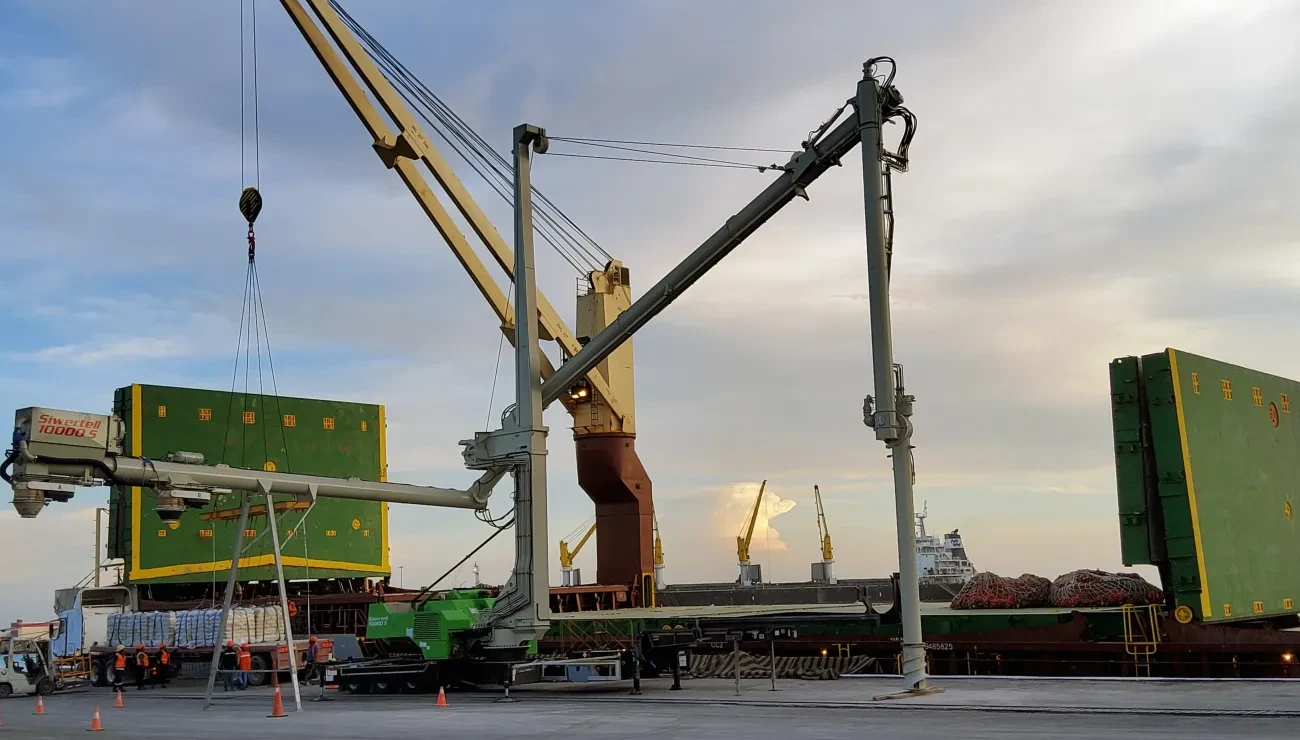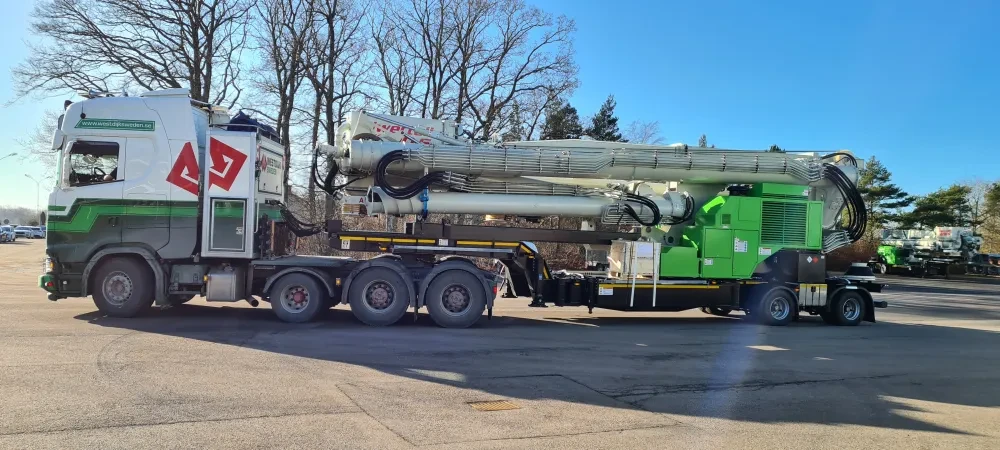
Agile dry bulk handling assets drive cost-saving advances
9 Jun 2025Global ports are facing unsettled times. Hesitation in world trades, along with rising interest rates, geopolitical tensions and slow growth in many economies, mean that for ports to survive, adaptability to long-term and short-term disruptions is key.
The ability to move dry bulk handling technology between ports is not only enabling operators to serve smaller, less developed ports, it is also ensuring that operators can move and match assets to vessel size, lowering the cost of the end product.
Ports have always been exposed to market turbulence and dry bulk handling operators have to be some of the most agile stakeholders. According to Global Market Insights, the dry bulk shipping market was valued at USD 162.6 billion in 2023 and until 2032, is expected to keep growing at a rate of over four percent. This growth is particularly driven by urbanization projects, requiring construction materials such as cement and steel, which in turn, is driving the need for specialized bulkers.

Urban-focused trade
The World Bank estimates that over 50 percent of the global population lives in urban areas, and by 2045, the world urban population will increase to six billion, intensifying pressure on these areas and the dry bulk handling market. This intensity is coupled with the rising adoption of environmental protection policies and the outlawing of practices and technologies that have a harmful impact on the environment. However, volatility in commodity pricing and huge fluctuations in demand are taking their toll.
What then can an operator do to respond effectively, and prepare for growth? Agility in these times is key, with some dry bulk trades requiring very dynamic responses, and none more so than the cement industry.
Since their introduction to the market more than thirty years ago, Siwertell road-mobile ship unloaders have offered a new business model for dry bulk handlers, one that does not require specialized port facilities or significant infrastructure. Initially targeted at the cement industry, precisely to meet the dynamics of this trade, by simply deploying a road-mobile unloader on the quay, a port operator can turn it into a temporary bulk handling terminal. Even more than this, Siwertell road-mobile unloaders offer enclosed, screw-type conveying lines, which eliminate spillage and keep sites dust free.

Maximizing work for emissions
Like port operators, ship operators are also under considerable pressure. Shipping has a lower carbon footprint than other transport modes, but more than ever, operators need to optimize the efficiency of their routes, get their cargoes as close as possible to where they are needed, and discharge vessels as fast as possible.
It is likely that agile, effective dry bulk handling machinery, which can ensure the highest levels of through-ship efficiency, will come under even greater scrutiny in the coming years, with both the International Maritime Organization (IMO) and the European Commission (EC) introducing new laws that govern the fuel ships use, including new levies on ship ton-miles via the EU Emissions Trading System (ETS).
These new regulations mean that shipping will need to revisit many trades and acclimatize to a new operating logic, currently a matter of intense discussion by regulators. Whatever is decided, lines will need to seek new efficiencies, maximizing the work that ships do for the given value of their emissions.
Enabling global shifts in strategy
Port operators may need to take proactive measures to be part of this global shift in strategy, while keeping additional capital investment at manageable levels. Not every port can afford the construction costs of a reinforced jetty sufficient to support large, fixed ship unloading equipment and jetty conveyors, but by introducing low weight, flexible Siwertell road-mobile unloaders to such a facility, which also ensures market-leading through-ship capacity, it could become a multipurpose cargo handling terminal in minutes.
Global dry bulk trades are currently served by a 150 Siwertell road-mobile ship unloaders. Mounted on a truck trailer, they are the leading choice for an importer, which does not own the quay on which they operate, needs to serve multiple ports, or requires high levels of in-port mobility. Siwertell road-mobile unloaders offer rated ship unloading capacities of up to 500t/h, and can quickly deploy in under an hour.
Instead of requiring several installations, as they might have done previously, operators of 5 000 S, 10 000 S and 15 000 S road-mobile unloaders are discovering that their dry bulk handling machines can be used at almost any quayside, meaning the flexible operation of one piece of equipment, which dramatically reduces costs.
Changing to this business model has had an extraordinary effect for some operators. Equipped with both a Siwertell 5 000 S and 10 000 S road-mobile unloader, one Middle East customer has been able to unload shipments of cement closer to where each of its customers are situated, and match the receiving vessel’s size to the unloading equipment, leveraging the very best of its two Siwertell ship unloaders’ capabilities.
“In this case, our customer was able to bring down the final cost of cement to end customers in the Middle-East region, based entirely on the savings made through operation of our road-mobile unloaders,” explains Jörgen Ojeda, Sales Director Mobile Unloaders, Bruks Siwertell. “The difference really is that clear-cut.”
The closer the better
“The closer cement is unloaded to the site where it is needed, the better, and volumes and demands change rapidly, which is why many customers in that market are choosing road-mobile unloaders,” Ojeda continues. “Instead of relying on local port facilities and their unloading equipment, some importers are now taking matters into their own hands, and insourcing this flexible capability their own mobile ship unloading asset, such are the cost benefits to the business. It also guarantees continuity of operations by ensuring an operator has access to the equipment they need, whenever they need it.”
The flexibility of a Siwertell road-mobile unloader, like other Siwertell ship unloading models, is further enhanced with its ability to handle dozens of bulk cargoes. When necessary, they can be modified to discharge hazardous, volatile or self-igniting materials, such as sulfur, biomass and grain. Road-mobile unloaders can be diesel-driven or fully electric and discharge dry bulk material to a variety of arrangements including awaiting trucks.
A double-bellows unloading system allows for the sequential loading of trucks; as one truck is filled, the next one moves into position. This ensures continuous vessel discharge whilst the ship unloader is in operation, depending on the availability of trucks. Overall, the double-bellows system improves unloading efficiency by 30 percent, in comparison with a single-bellows system.
Lean investment models
Several years ago, Bruks Siwertell introduced next-generation road-mobile unloader models, which incorporate a number of system upgrades from mechanical to electrical, including a built-in fieldbus interface to reduce cabling requirements and their associated maintenance needs, while offering precise, responsive user control. With their new digital technologies, operators can also benefit from the introduction of advanced remote diagnostics and support; an invaluable asset when working in remote locations.
Advances have also extended to customer service, including new types of planned service agreements, the use of augmented reality glasses and the latest programmable logic controllers (PLCs), which ensure peak operational performance and deliver advanced troubleshooting as well; an invaluable asset when working in remote locations.
“These scalable planned service agreements, coupled with the agility of our road-mobile ship unloading systems, mean that customers do not pay for more than they need. Ship unloading solutions that can move to meet the vessel, relocate to meet the cargo, and also step in to add additional ship unloading capacity to a jetty during peak demand, all culminate to deliver a highly agile asset that brings far reaching benefits to a dynamically changing port sector; it is not hard to see why Siwertell road-mobile unloaders are so popular,” concludes Ojeda.
PLEASE CONTACT US FOR MORE INFORMATION

 Bruks-Siwertell
Bruks-Siwertell